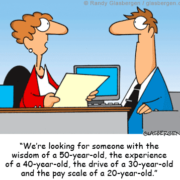“Double-nickeled and Stuck! Getting re-employed at 55 or beyond” – Part Two
In part-one of this series, we took a look at some of the psychological and emotional steps necessary to enhance chances of finding employment after 55. In part-two, I’d like to address the issue of being prepared for the energy and commitment a full-on job search will take.
My comments will be based on someone initiating a self-directed job search i.e. without the help of a coach. This will apply to most, especially amongst male job seekers. I have found that female job-seekers are more open to working with a career coach than men – mostly an ego thing (hey guys, I get it! I are one!)
In my experience, the statistic that I mentioned in Part One regarding length of search holds pretty true for self-directed searches i.e. count on one month of search for every $10,000 in salary you are seeking. Certainly there are exceptions to this, some searches being shorter, some longer. Lots of things can impact the length: degree of job specialization, willingness to relocate, flexibility on salary are a few.
One of the biggest influences on shortening the job search is the depth of commitment to a disciplined, structured job search. And that’s where the energy – physical and emotional – can come into play.
In Part Three of this series, we will dig into how job search has changed and the activities required to conduct an effective job search in today’s job market. But here, we want to better prepare you for the rigors of the search.
A couple of things can come into play that will affect your attitude and thus your energy. First, you may well be carrying forward some anger or resentment over the separation which can be a definite energy robber. Secondly, you will most likely be stepping into unfamiliar territory and find the process confusing. This too is an energy drain.
My suggestions for preparation for this process are simple:

- Increase your aerobic and anaerobic exercise by at least 50%. For some coming from a “cubical nation” job, a doubling might even be better. Mild depression, sudden extra “free time”, confusion on where to start – all of these can easily lead to bad health habits with failing to exercise being one of the most serious mistakes. It’s pretty simple biologically – your brain, in particular, needs oxygen to think more clearly. Remember also that “sitting is the new smoking” (a bit of a stretch, but you get the point). Job searches, chairs and computer screens are all linked so get out of your Office Depot faux-leather throne at least three times an hour and take a five minute walking break.
- Modify your diet. I suspect you aren’t a vegan or a vegetarian. But during a job search, I’m suggesting you might want to get closer to either. Increase your intake of fruits and vegetables and healthy carbs suchs as nuts, legumes and keep the animal protein lean. Better yet, keep the animal products to a minimum. Above all, eliminate the high glycemic load foods (pastries come to mind) that cause energy and mood swings. Oh – and this one is tough – stop the coffee after noon (caffeine has a six-hour half life) or replace coffee with green tea.

- Get 7-8 hours of uninterrupted sleep. This should probably be number one. You may be one of those hard-chargers who has convinced him/herself that you can get by on 5-6 hours. May have even been doing it for years. Well, the data is in and it’s conclusive – that’s a life shortening habit and a definite drawback during a rigorous job search. Your energy levels will be noticeably higher with proper sleep. Check out this article if you aren’t convinced.

- Start your day with some form of meditation and statements of gratitude. I hope you are of the understanding that the ONE thing in life that we can truly control is our thoughts. Coming off a stinging RIF, you may be inclined to let them slide to the wrong side of the thought ledger. Sitting in prayer or meditation for 15 minutes and either stating out loud or writing in a journal what you are grateful for each day can get you started with the high energy day that it requires.
“Sound when stretched is music. Movement when stretched is dance. Mind when stretched is meditation. Life when stretched is celebration.”
Shri Ravishanker Jee
The last suggestion I have in this area is to guard against letting the search overwhelm you. I suggest, even though you will likely have a very high feeling of urgency about this, to keep your focused search effort to no more than thirty hours a week. The operative word here is “focused”. Beyond thirty hours, you will approach burn-out and start hitting a frustration level that will detract from your effectiveness and tempt you to move away from your focused, structured process.
In Part-Three, we will go into the complexities of today’s job search, how it’s changed and lay out some suggestions for building structure and focus into your job search.
What has worked for you for building and maintaining energy and focus for your job search? Scroll down and leave a comment – we’d love to hear from you.


 In this part-one of a three-part series on “Double-nickeled and Stuck! Getting re-employed at 55 or beyond”, we will begin to take a look at the reality of what it takes to regain meaningful employment in today’s rapidly evolving workplace and at the process it takes to be prepared for the challenges ahead.
In this part-one of a three-part series on “Double-nickeled and Stuck! Getting re-employed at 55 or beyond”, we will begin to take a look at the reality of what it takes to regain meaningful employment in today’s rapidly evolving workplace and at the process it takes to be prepared for the challenges ahead.


